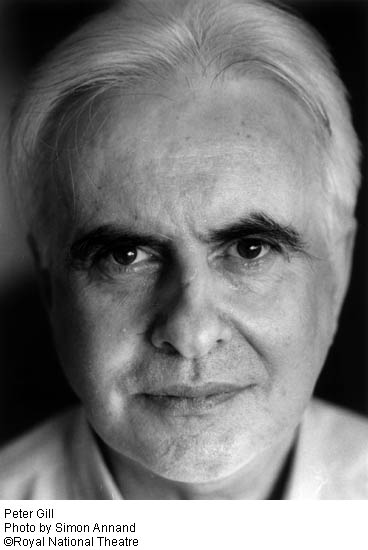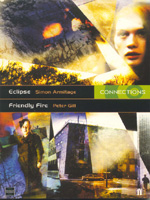|
Loading
|
|
|
 Friendly
Fire
Friendly
Fire
by Peter Gill
Part of the 1999 season of BT National Connections where youth theatre groups performed one of a number of new plays commissioned for the scheme.
Friendly Fire is the story of nine young people and a statue of a private soldier in the First World War. At its heart is a trio of people — each in love with the other, but in the wrong order. Adie likes Gary, but Gary likes Shelley, who likes Adie. None of this is simple, as the three discover as they struggle to understand and cope with the hand life and love have dealt them and 'sort out what they can put up with, and what they can't'. Insightful, tough and moving, this is an important new play offering outstanding roles.
For a cast of ten, Friendly Fire is appropriate for the mid/upper age range. It contains some swearing. It has six settings, but can be performed with no scenery or props. It benefits from a fluid production with emphasis on acting skills.
Eclipse/Friendly Fire

Connections series, Drama, Ages 11-19
By Simon Armitage and Peter Gill, December 1999, Nelson Thornes, UK, ISBN: 0748742905, 105 p. $17.95 paper original
Six friends are interviewed by the police after the disappearance of Lucy Lime, the strange unnerving girl - "I am a walking Universe, I am" - whom they met on the beach beneath the cliffs. Adie likes Gary who like Shelley who likes Adie. Relationships are strained as they "sort out what they can put up with, and what they can't" - under the shadow of a soldier on a Great War memorial. Eclipse by Simon Armitage and Friendly Fire by Peter Gill were specially commissioned by the Royal National Theatre for the BT National Connections Scheme for young people.
Activities
See Connections Plays Online for activities related to this play:
There are no adults in Peter Gill's play. There are no children either. Rather, all of the characters seem to be in a sort of limbo in which they feel no certainty about who they are or where they are going. They hang around together because that's what they've always done, but their lives are changing. Old allegiances are strained by new feelings; old assumptions are questioned by new insights.
Like Edward Bond's 'Saved' and the work of Sarah Kane, 'Friendly Fire' is a challenging play but one which is ultimately rewarding to study and produce precisely because it is so robust in what it says and the way it says it. At first glance teachers and students may be shocked by its use of strong language, nonplussed by the apparently inconsequential dialogue, or confused by the terrifyingly surreal ending. But while the characters may initially seem shallow, bleak and gratuitous, behind their 'front' lies a depth of compassion and morality. The drama of 'Friendly Fire' is in the young people's struggle to come to terms with their feelings of loss, love and alienation as they depart from childhood and await entry into an adult world that makes public displays of caring (represented by the war memorial) but doesn't actually care enough to change anything.
'Friendly Fire' is not an easy play to work on. The different themes it explores and the different techniques employed by Peter Gill work so closely together they are like a theatrical mobius strip. Just as you can't say where the beginning of a mobius strip is or even determine which is inside and which is outside, with 'Friendly Fire' the form and content are so intertwined that the only really effective way of understanding the play is to experience it in practice. Sixth-form or senior youth groups will doubtless emerge wiser should they do so.
Activities devised by Andy Kempe.
| ADIE | You're afraid when you ain't got power. |
| GARY | You took Shelley. |
| EDIE | I never did. |
| GARY | I'm so lonely. |
| ADIE | Oh, yeah. |
| GARY | When was you like it? |
| ADIE | Last year. |
| GARY | When you was in hospital? |
| ADIE | It was when I realised it was hopeless. That I was, that you was. The knowledge dropped like a stone. A thud. The knowledge that what I imagined could happen was false. I was falling, falling. The knowledge dropped into real knowledge. The feeling. The knowledge. Hopeless. But it can't be hopeless cos you're hoping. Lost all confidence. I ain't got any. |
| GARY | You're my friend. My only one. I don't care about no one else. I don't. If only you was a girl, Adie. |
| ADIE | I don't want to be a girl, thanks. |
| GARY | I know. But it would sort it. |
| ADIE | For you it would, mate. I've always forgiven you. You always get forgiven, you. I'll always... |
| GARY | Shelley loves you. |
| ADIE | No. |
| GARY | She do, Adie. She'll never say. But she do. Why can't you face that? |
| ADIE | I don't want to. It's Shelley. I can't. |
| GARY | You don't like Shelley like I like you. |
| ADIE | I like her like I like her. Leave me alone. |
| GARY | If we could divvy it all up, it would be alright. |
| ADIE | What we gonna do? |
| GARY | Dunno. |
| ADIE | You're in charge. You are, Gary, You know that. |
| GARY | Not of Shelley. |
| ADIE | Of me. |
| GARY | We have to live. Live. Don't we? Best we can. Sort out what we can put up with, what we can't. Hope something comes out. |